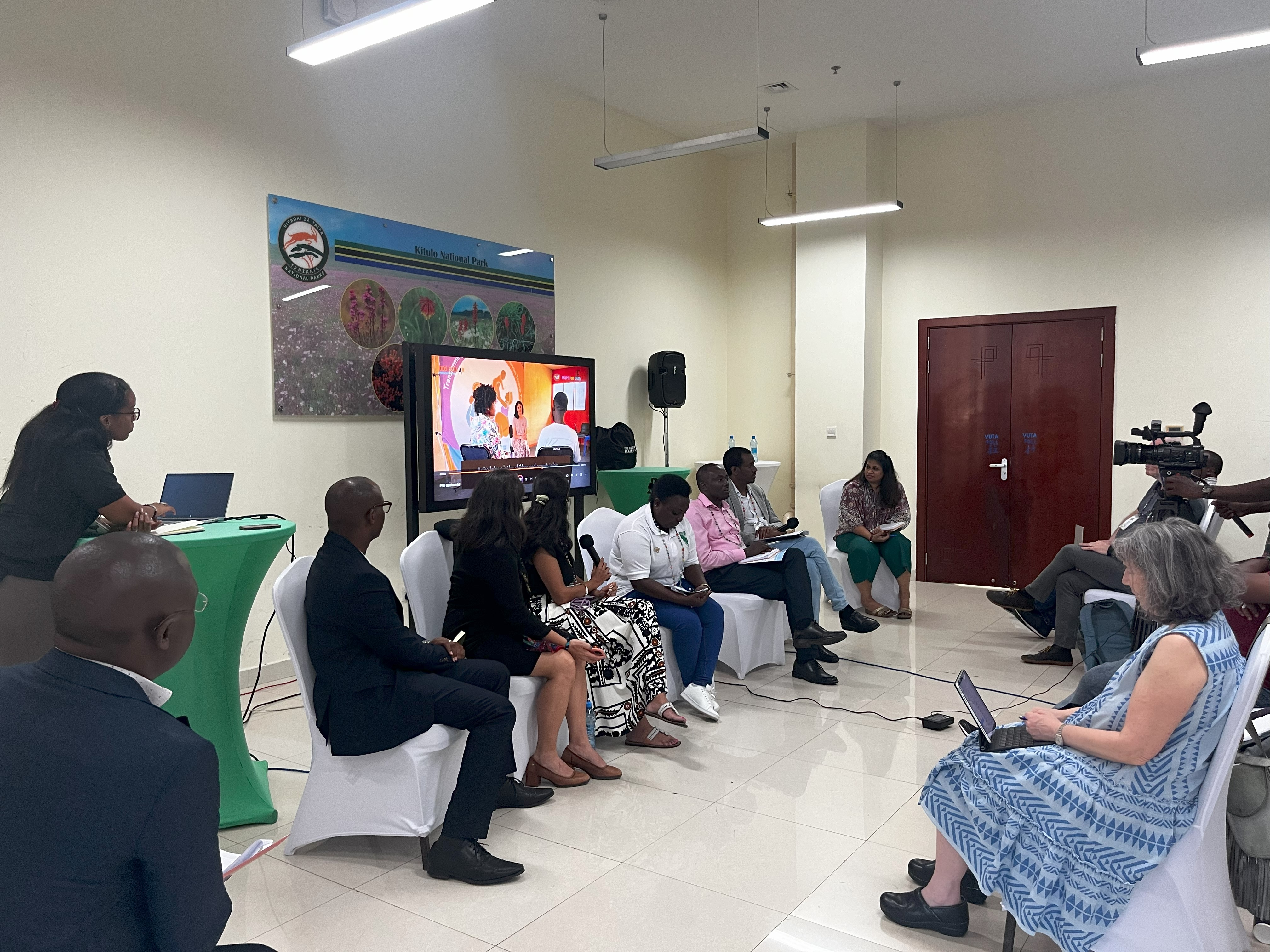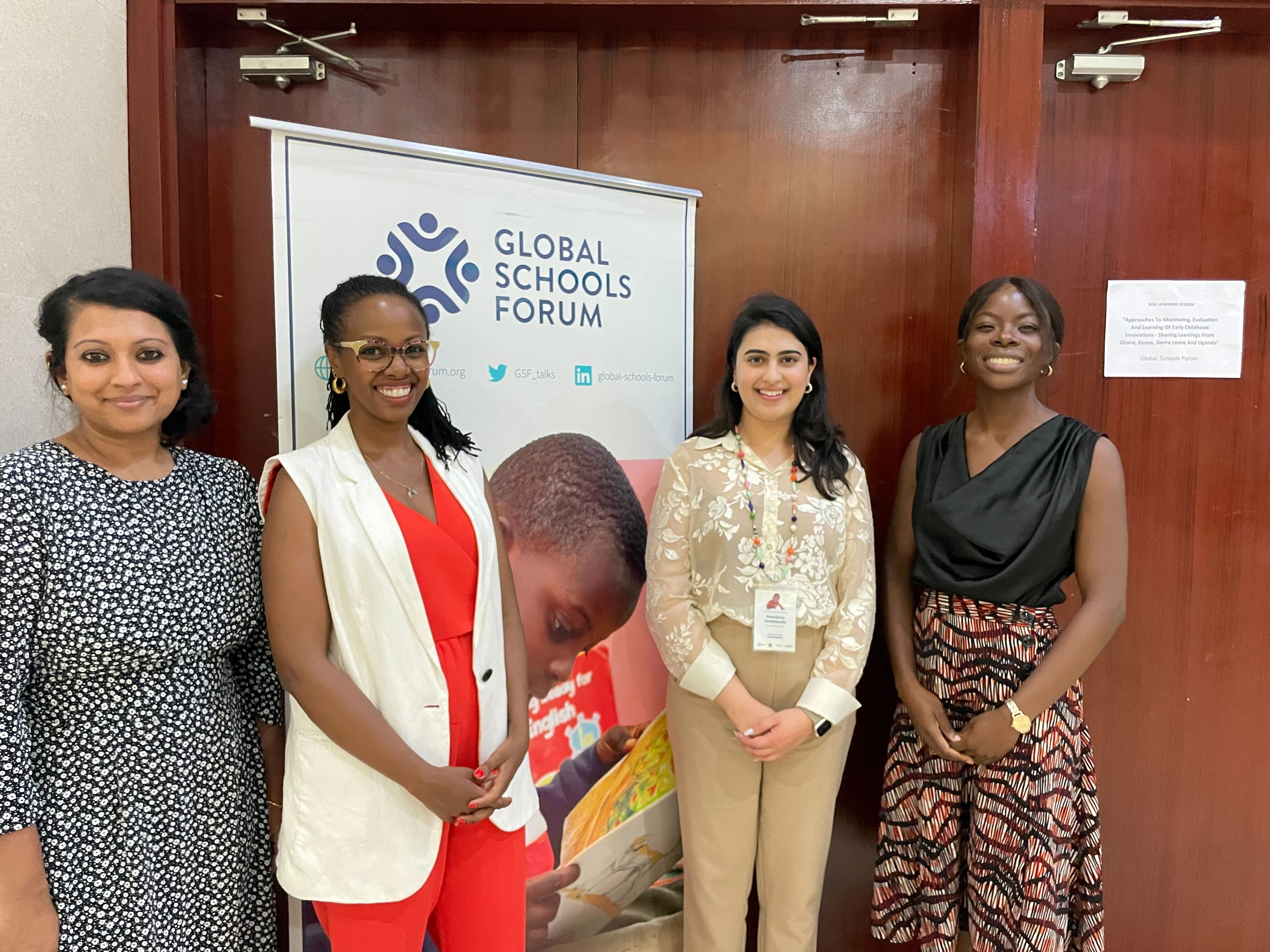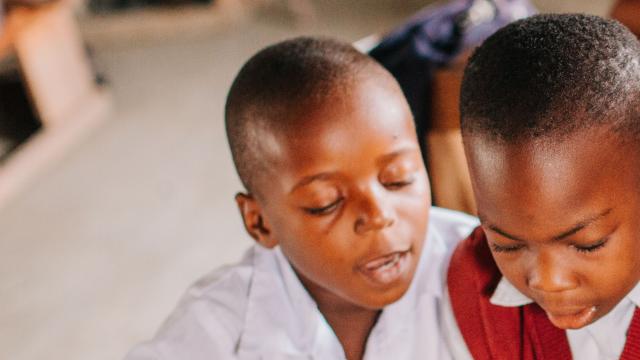The Global Schools Forum recently participated in the East Africa Regional Early Childhood Conference held in Dar-es-Salaam, Tanzania. The conference, themed "Investing in Early Childhood: Building Human Capital along the Life Course," aimed to assess the current state of early childhood development in the region, facilitate knowledge sharing, and explore strategies for scaling innovative models of high-quality early childhood interventions. The conference was attended by a diverse set of stakeholders interested in improving early childhood outcomes like policy makers, researchers, CSOs, academia, funders, early childhood practitioners, government ministries.
Within a jam-packed agenda, GSF organised two learning sessions. The first session, in collaboration with Innovations for Poverty Action focussed on exploring dual generation approaches for early childhood education and development in refugee contexts. The second session delved into understanding approaches to monitoring, evaluation and learning of early childhood innovations, sharing learning from Ghana, Kenya, Sierra Leone and Uganda.
For our first session on dual gen, we were joined by UNICEF Uganda, BRAC, Children in Crossfire, Children on the Edge, Kulea Watoto and Learn to Play. The primary objective of the session was to discuss the underpinning theory of the approach and its criticality for refugee settings, highlight innovative programming strategies and models, discuss areas of future research and opportunities for advocacy on policy and regulation to scale the approach. Here are the key discussion points:
- Equipping youth with technical abilities, entrepreneurial skills, and capital, to establish Early Childhood Development (ECD) centres in targeted communities offers a promising dual-gen strategy. UNICEF Uganda is implementing the STRYIDES program (Skill and Transform Resilient Youth to Invest in the Development of Early Childhood ) where it is providing demand-driven skills to young people, often women, to become accredited caregivers and entrepreneurs.
- Effective partnerships and collaborations are essential for maximising impact in dual-generational programs. The Kulea Watoto consortium exemplifies this by forging connections among various children's services and livelihood training initiatives. Children in Crossfire also innovatively engages in effective partnerships, like supporting parental coaching sessions through coffee ceremonies, aiding young mothers in income generation via IGA/VSLA, establishing Community Care Coalitions to assist with parenting and resource mobilization etc.

- Local ownership and community participation is key to long term sustainability of programs: Children on the Edge uses a unique approach to engage with families and the community, like involving parents in Cluster Management Committees to manage finances and ensure smooth operation of their cluster learning groups, receiving contributions from the community to set up ECD centers in the form of houses, yards or churches among other activities.
- The integration of initiatives for children and caregivers, as much as possible, should happen for the same families: BRAC has innovatively integrated the Ultra Poor Graduation (UPG) Programme with its Humanitarian Play Labs (HPLs) program. This involves integrating sustainable play spaces, affordable materials, and a play-based curriculum, with the empowerment of parents.
- Supporting caregivers with play is an important component of dual-generational programming: Learn To Play has a Parent Playbox developed in partnership with Kids Collab that provides parents/caregivers of children ages 0-5 with knowledge, confidence and resources on how to purposefully interact with their children. Children on the Edge and Learn to Play, in partnership with The University of Chichester (UK), have also developed a Play-based Programme Assessment Tool to enhance the quality of Early Childhood Education (ECE) provision.
Our second session on Approaches to monitoring, evaluation and learning of early childhood innovations – sharing learnings from Ghana, Kenya, Sierra Leone and Uganda brought together three GSF members, including Lively Minds, Streetchild and Tiny Totos, all working in the early childhood space in east Africa but delivering a diverse range of programmes and implementing monitoring, evaluation and learning (MEL) activities in different ways.

The session was set out with the objective of drawing attention to the existing gaps in the development of academic and research tools which have not supported the implementation and utilization of data and evidence among providers in the sector. Organisations operating early childhood programmes in low- and middle-income countries have limited partnerships with governments or research institutions developing monitoring tools, and practitioners are often left reinventing the wheel in silos. Where practitioners can access national or global monitoring and evaluation tools, there are often challenges to contextualise them to be relevant and meaningful. There is also often a gap between what is being measured and what is useful to drive learning and improvement at a programme level, leading to missed opportunities to use data to improve impact.
Lively Minds trains marginalised rural parents in Uganda and Ghana to run free educational Play Schemes for all the pre-schoolers in their community, and to provide better care for their children at home using their own resources. The programme is delivered by government using a train the trainer approach. Lively Minds have implemented a range of evaluation methods, including a Randomized Controlled Trial (RCT) of their programme in Ghana and a mixed method evaluation of their programme in Uganda. They have also developed a comprehensive performance management system to enable us to easily track quality and compliance of programme delivery.
Tiny Totos is building a network of market-based, independent, childcare providers in East Africa that provide stable livelihoods to owners, peace of mind to working mothers and nurturing care to the children they look after. Tiny Totos uses monitoring data from childcare providers, through a digital data collection tool, to monitor programme quality and to inform programme improvement and implementation.
Street Child in collaboration with The LEGO Foundation, as part of its Playful Learning Across the Years 2.0 (PLAY 2.0) program is undertaking a programme to contextualize, test, and use externally developed classroom observation and interview tools to measure the quality of play-based learning in Bangladesh, Sierra Leone, and Uganda.
Key learnings from their approaches:
- ‘Monitoring’ and ‘Evaluation’ are equally pertinent for determining programme impact and ensuring that programme activities are delivered to standard at scale as demonstrated by Lively Minds: The RCT conducted by Lively Mind in 2017 (results published in 2020) helped develop an understanding of specific areas of programmatic impact, such as on child development and parental attitudes and build evidence that their model works. To ensure consistency in the quality and fidelity of their programme, they have adopted a multi-pronged approach to collect routine monitoring data to assess progress towards critical termly timelines in partnership with government counterparts at the district level as well as through the schools themselves. Lively Minds maintains the quality of data through routine quality assurance checks and capacity building support. The routine monitoring coupled with internal and external evaluations ensures that there is adherence to standards and practices, and changes to the programme are not made in an ad-hoc manner.
- Democratizing data has enabled Tiny Totos to gain access to real-time unfiltered data from the ground: Tiny Totos is leading the way in democratizing childcare data by encouraging day care managers to input data using an easy to use mobile application on metrics such as revenue and profits, and they in turn feedback the daycare's child outcomes and overall network performance on the mobile application on an ongoing basis which has enabled them to build significant network strength, overlay their programmes with products and services to boost programme sustainability such as through loyalty points and access to credit, and continuously make programme adaptations using authentic data collected on an ongoing basis.
- Local adaptation of global tools is necessary to ensure they are fit for purpose: The PLAY toolkit aims to build a better understanding of ‘teaching and effective parental learning support that foster children’s engagement and underpin learning through play’. Even though there have been various efforts to standardise child outcomes and outline the ‘right’ ways that parents and caregivers can interact with children, in reality, these measures might seem prescriptive and far from the contextual reality in many countries or communities. Streetchild’s pilot programme to test the toolkit in Bangladesh, Sierra Leone, and Uganda aims to unveil such distinctions in what are feasible and contextually relevant methodologies that help define success for children and caregivers.

